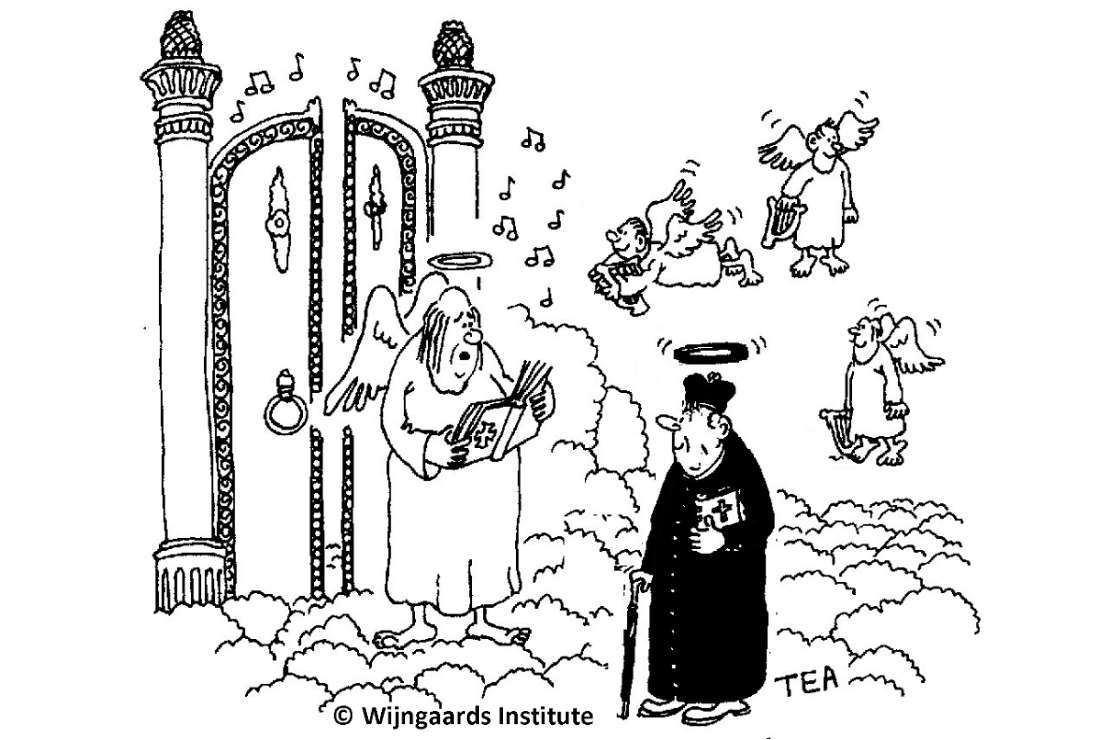All Jesus’ followers, everyone baptised in his name, in principle possesses the gift of prophecy

'Don't knock out your pharmacist, Father! You need him for your gout.' (Illustration: Tom Adcock)
“Truly I tell you, among those born of women there has not risen anyone greater than John the Baptist; yet whoever is least in the kingdom of heaven is greater than he” (Matthew 11,10-11).
“Do not worry about what to say or how to say it. At that time you will be given what to say, for it will not be you speaking, but the Spirit of your Father speaking through you” (Matthew 10,17-20).
On one of my lecture tours I was the guest of the bishop of a small missionary diocese in the North of India. He told me an interesting story. I will recount it with some small alterations for the sake of anonymity. The substance is true.
“Every Christmas we had a huge problem,” the bishop told me. “The local shah and his extended family would turn up for Christmas Mass in the cathedral, occupying the first five rows of benches on every side. As Muslims, they too wanted to celebrate Christ’s birth. But our own Christians, mainly from poor low-class backgrounds, were pushed aside at that most important feast every year. I did not know what to do — till I read about the legend of the cunning painter Fernando. Do you know it?”
“No”, I said.
“Well, a Spanish king was blind in one eye and lame in one leg. One day, the king announced that he was looking for an artist who would paint an elegant portrait of himself. None of the established painters dared to consider the job as it was infeasible for them to paint an angelic portrait of a physically disabled man. However, Fernando agreed and painted a classic picture of the king — a painting so phenomenal that it earned admiration. He painted the king hunting aiming at a deer, targeting with one eye closed and one leg bent. I concluded that I too needed to be cunning. I discussed this with my secretary. ‘I need to give the shah a clever excuse’, I told him.”.
“He advised me against it. ‘No’, he said. ‘Why not be straightforward? Just explain your predicament to the shah’. Well, after some thinking I decided to follow his prophetic advice. Yes, my secretary was proven right. The shah understood. We agreed to have a shared Christian-Muslim celebration of Jesus’ birth in the afternoon of every Christmas day.”
Prophets
Let us start by realizing that we miss the point if we think that a prophet is someone who foretells the future. No, in the biblical understanding of the term, a prophet speaks authoritatively in God’s name. When God concluded a covenant with the Jewish people, three distinct ministries emerged: priests who sacrificed in the temple, kings who governed and prophets who spoke messages in God’s name. The role played by prophets is well illustrated in the Old Testament books recording their sayings: the four major and twelve minor prophets. In Hebrew a prophet was called a Nevi’, probably meaning a person in whom fire bubbles up.
It is worth noting also that these prophets came from all kinds of social backgrounds. Isaiah worked at the royal court in Jerusalem. Jeremiah and Ezekiel served in the temple as priests. Amos herded a flock of sheep. Hosea was probably a businessman. Nehemiah, a Hebrew exile, worked for the king of Persia. Yes, these were ordinary people. Seeing what was wrong in their day and age., they would feel God’s anger bubble up in them. Then, inspired by God’s Spirit, they would manifest God’s will.
Jesus accepted the authority of the Old Testament prophets. In his preaching, he often referred to them in general terms (Luke 6,23; 11,47; Matthew 13,17). But he also mentioned them by name: for instance Elijah (Luke 4,25-26); Elisha (Luke 4,27); Isaiah (Matthew 12,17) and Jonah (Matthew 12,39).
Prophets in Jesus’ own time
Jesus obviously regarded John the Baptist as a true prophet. On one occasion he stated clearly: “What did you go out to see? A prophet? Yes, I tell you, and more than a prophet … Truly I tell you, among those born of women there has not risen anyone greater than John the Baptist; yet whoever is least in the kingdom of heaven is greater than he” (Matthew 11,9-11).
But notice that last phrase: “whoever is least in the kingdom of heaven is greater than John the Baptist” (Matthew 11,11). It means that all Jesus’ followers, everyone baptized in his name, in principle possesses the gift of prophecy. He also says this clearly in this statement:
“You will be handed over to the local councils and be flogged in the synagogues. On my account, you will be brought before governors and kings as witnesses to them and to the Gentiles. But when they arrest you, do not worry about what to say or how to say it. At that time you will be given what to say, for it will not be you speaking, but the Spirit of your Father speaking through you” (Matthew 10,17-20).
And the Spirit will speak through God’s people not only in such dramatic moments as when interrogated in captivity. God’s Spirit may speak when, in ethical or religious matters, members of the faithful give their honest advice. Jesus too heard his Father’s Spirit in what people said to him. It is remarkable to note how often Jesus allowed himself to be led by suggestions made by others.
- At Cana, Jesus had not intended to do a miracle. “My hour has not yet come” (John 2,4). Yet he performed the miracle because his mother asked him to do so.
- It was actually Andrew who first introduced Simon Peter to Jesus. Jesus rewarded Andrew’s initiative by accepting Peter as one of the apostles.
- Jesus gave in to Nicodemus who wanted to speak to him at night.
- He said “yes” to the Samaritans of Sychar when they requested him to stay for some days in their city.
Questions
- Why do church leaders usually act as if the gift of prophecy has been lost in our time? Do they sufficiently realize that they should pay attention to that voice?
- Of course, discernment is required. Some honest persons may give advice which on careful examination proves to be misguided. But may a multiplicity of voices be so easily dismissed? If, for instance, as polls indicate, voices calling for the priestly ordination of women are supported by more than 70% of Catholics in major countries, should they not be listened to? No prophetic authority in their voices?
Published by arrangement with the Wijngaards Institute for Catholic Research
*The views expressed in this article are those of the author and do not necessarily reflect the official editorial position of UCA News.










